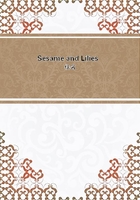
第26章
Just on the other side of the Mersey you have your Snowdon, and your Menai Straits, and that mighty granite rock beyond the moors of Anglesea, splendid in its heathery crest, and foot planted in the deep sea, once thought of as sacred--a divine promontory, looking westward; the Holy Head or Headland, still not without awe when its red light glares first through storm. These are the hills, and these the bays and blue inlets, which, among the Greeks, would have been always loved, always fateful in influence on the national mind.
That Snowdon is your Parnassus; but where are its Muses? That Holyhead mountain is your Island of AEgina; but where is its Temple to Minerva?
Shall I read you what the Christian Minerva had achieved under the shadow of our Parnassus up to the year 1848?--Here is a little account of a Welsh school, from page 261 of the Report on Wales, published by the Committee of Council on Education. This is a school close to a town containing 5,000 persons:-"I then called up a larger class, most of whom had recently come to the school. Three girls repeatedly declared they had never heard of Christ, and two that they had never heard of God. Two out of six thought Christ was on earth now" (they might have had a worse thought perhaps), "three knew nothing about the Crucifixion. Four out of seven did not know the names of the months nor the number of days in a year. They had no notion of addition beyond two and two, or three and three; their minds were perfect blanks."Oh, ye women of England! from the Princess of that Wales to the simplest of you, do not think your own children can be brought into their true fold of rest, while these are scattered on the hills, as sheep having no shepherd. And do not think your daughters can be trained to the truth of their own human beauty, while the pleasant places, which God made at once for their schoolroom and their playground, lie desolate and defiled. You cannot baptize them rightly in those inch-deep fonts of yours, unless you baptize them also in the sweet waters which the great Lawgiver strikes forth for ever from the rocks of your native land--waters which a Pagan would have worshipped in their purity, and you worship only with pollution. You cannot lead your children faithfully to those narrow axe-hewn church altars of yours, while the dark azure altars in heaven--the mountains that sustain your island throne,--mountains on which a Pagan would have seen the powers of heaven rest in every wreathed cloud--remain for you without inscription; altars built, not to, but by an Unknown God.
(III.) Thus far, then, of the nature, thus far of the teaching, of woman, and thus of her household office, and queenliness. We now come to our last, our widest question.--What is her queenly office with respect to the state?
Generally, we are under an impression that a man's duties are public, and a woman's private. But this is not altogether so. Aman has a personal work or duty, relating to his own home, and a public work or duty, which is the expansion of the other, relating to the state. So a woman has a personal work or duty, relating to her own home, and a public work or duty, which is also the expansion of that.
Now the man's work for his own home is, as has been said, to secure its maintenance, progress, and defence; the woman's to secure its order, comfort, and loveliness.
Expand both these functions. The man's duty as a member of a commonwealth, is to assist in the maintenance, in the advance, in the defence of the state. The woman's duty, as a member of the commonwealth, is to assist in the ordering, in the comforting, and in the beautiful adornment of the state.
What the man is at his own gate, defending it, if need be, against insult and spoil, that also, not in a less, but in a more devoted measure, he is to be at the gate of his country, leaving his home, if need be, even to the spoiler, to do his more incumbent work there.
And, in like manner, what the woman is to be within her gates, as the centre of order, the balm of distress, and the mirror of beauty:
that she is also to be without her gates, where order is more difficult, distress more imminent, loveliness more rare.
And as within the human heart there is always set an instinct for all its real duties,--an instinct which you cannot quench, but only warp and corrupt if you withdraw it from its true purpose:- as there is the intense instinct of love, which, rightly disciplined, maintains all the sanctities of life, and, misdirected, undermines them; and MUST do either the one or the other;--so there is in the human heart an inextinguishable instinct, the love of power, which, rightly directed, maintains all the majesty of law and life, and, misdirected, wrecks them.
Deep rooted in the innermost life of the heart of man, and of the heart of woman, God set it there, and God keeps it there.--Vainly, as falsely, you blame or rebuke the desire of power!--For Heaven's sake, and for Man's sake, desire it all you can. But WHAT power?
That is all the question. Power to destroy? the lion's limb, and the dragon's breath? Not so. Power to heal, to redeem, to guide, and to guard. Power of the sceptre and shield; the power of the royal hand that heals in touching,--that binds the fiend, and looses the captive; the throne that is founded on the rock of Justice, and descended from only by steps of Mercy. Will you not covet such power as this, and seek such throne as this, and be no more housewives, but queens?